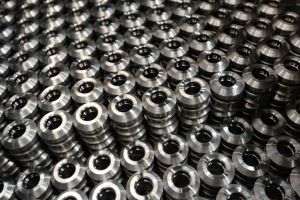Călin Rechea
Romania did not know how or perhaps it did not want to profit from the opportunity of the 90s crisis to restructure its economy. In the coming decade, the stringent need for restructuring disappeared, as it was drowned in the wave of global optimism, generated by the monetary excesses promoted by the Federal Reserve.
Now the bill is due, and our authorities seem incapable of understanding, after the rushed agreement with the IMF, that the very existence of the agreement is a "guarantee" of prolonging the crisis.
Why? Because the structure of the economy bears the print of cheap money, and a new loan can only extend the agony.
A recent research report of the Federal Reserve Bank of New York ("Credit Market Competition and the Nature of Firms", Federal Reserve Bank of New York Staff Reports, no. 366) shows the importance of the conditions of the credit market on the growth perspectives over the companies in the economy.
What is the point that Nicola Cetorelli, the author of the report, is trying to make? That when it becomes difficult to attract capital from the market, new companies have to be created on solid foundations, or else their intrinsic structure will be extremely fragile. In other words, cheap money leads to the creation of companies that in the long run, won"t be "steam engines" to the economy, but just candidates to a quick bankruptcy.
Based on confidential data from the US Census Bureau, for the 1975 - 2005 period, the author proves that the nature of companies is deeply affected by the lending conditions in the market at the moment of their creation. With the help of an econometric study, Cetorelli demonstrates that an economic environment with harsh lending conditions favors the creation and development of solid companies. In turn, companies created in a lax lending environment, have a far weaker structure.
Even though the results of the study are not directly applicable to Romania"s economy, it can be said that companies created after 2000 had the benefit of an economic environment where funding was readily accessible. This is what allowed the development of many companies that grew in spite of faulty management and of inadequate allocation of financial resources. It is very likely that companies created between 2004 and 2008 (author"s note: the period where lending was booming, amid a relaxed monetary policy) are the most vulnerable in the current crisis conditions.
A comparison between the growth of turnover and industrial output (author"s note: annual growth rates) and the evolution of government lending (see chart) shows that a slowing down of lending was enough to cause a severe contraction of the industrial sector.
What is going to happen if the expansion of lending scales down by 5 - 10% in 2009? But what if this phenomenon happened were the net outflows of foreign capital to exceed the average of 1% of the GDP, as estimated by the IMF for the economies of emerging countries, in its latest Global Financial Stability Report?
Romania"s economy is "sentenced" to adapt to a financial global environment where interest rates gradually return to normal. While risk aversion remains on the foreign and international markets, any additional step towards the relaxation of the monetary policy will not have any effect on the funding costs and will not lead to the stimulation of the real economy.
Given the lack of drastic domestic measures, that would stimulate work and innovation, can Romania escape the crisis simply by riding Europe"s coattails?
Unfortunately, Europe is in the same situation, according to a recent study by the Bruegel Institute in Brussels ("Handle with Care! Post-Crisis Growth in the EU", Policy Brief 02/2009, April 2009). The authors warn the European governments that providing state aid to companies that acutely need restructuring will only prevent economic growth, once the crisis is over: The temptation to rescue big industrial companies with government funding will always be there", but "this will hinder economic growth, because it prevents allocating resources to segments which have the highest growth potential".
How can the European authorities, who didn"t see the crisis coming, find out which economic sectors have the highest growth potential, if the markets aren"t really free? Let us not forget that the interest of politicians does not go beyond getting re-elected, and aiding certain companies is only done because unemployment harms the politician"s chances of getting re-elected. Great Britain"s dumbfounding budget, introduced yesterday by Gordon Brown"s Labor government, illustrates the sacrifice of a country"s future in order to hold on to power at any cost.
In their study, Jean Pisani-Ferry and Bruno van Pottelsberghe also expose the problems created by the politicization of the lending criteria: "The more banks are dependent on governmental support, the more they will be inclined to behave in this manner". The actions of European politicians so far show us that the implementation of the actions of the Bruegel Institute isn"t likely to happen.
Romania was lost in transition for too long, to afford to hope for Europe"s recovery to get us out of the crisis. Given these circumstances, is Romania sentenced to underdevelopment? Not at all! Just like the study of the Bruegel institute shows, "the seeds of the future economic growth are sown - or not - in times of crisis". Foreign aid will be useless, if the state does not release its deadly grip on the economy.
Disclaimer: This article reflects solely the point of view of the author. It does not reflect or imply the opinions of his employer and does not constitute an investment recommendation.
















































